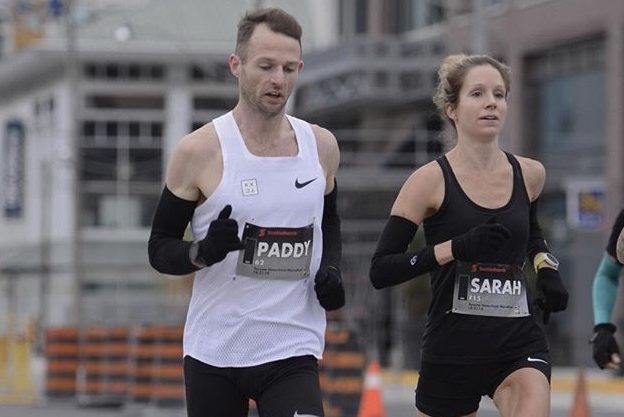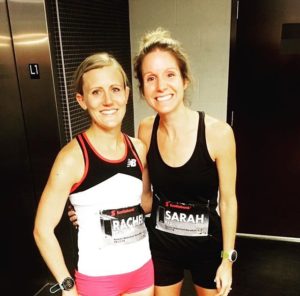If we’re lucky enough to run for a long time, we get to look back in amusement and realize just how little we knew when we started. With all the things we come to rely on so heavily–GPS, structured training, fuel, specific gear–the fact that so many of us make it to our first race without them seems like a miracle in hindsight. On the other hand, it might be evidence that we rely too heavily on these things. Nonetheless, our earliest running milestones are testaments to how far we can get with excitement, a little stubbornness, and whatever raw talent we might have at the start.
“I had no idea what an interval or fartlek was. I just ran at one pace at that time,” Sarah MacKay admits. In the lead up to and on the day of her first half marathon, Sarah had no help from GPS. “I didn’t know how fast I was running or how far, just that it felt great.”
With the eventual help of an online training program, Sarah ran her first marathon in 3:37, which punched her ticket to Boston. That could be an impressive enough end to her story, but Sarah followed it up with a win at the 2018 SeaWheeze Half Marathon in Vancouver (1:18), which then led to a 2:39 PB at the Scotiabank Toronto Waterfront Marathon in October of that year. The latter performance was just shy of an hour faster than Sarah’s first marathon and an eight minute improvement over her previous PB, set in London in April 2018.
“I think success isn’t just an outcome,” Sarah relates when I ask how she defines the word. “It’s really about the process of setting a goal and pushing yourself to achieve it.” If it was hard fought, then it was a success, and those breakthroughs certainly were. “It took me three tries to break three hours at the marathon,” Sarah explains, now able to laugh as she remembers, “I had to drop out of one race, tore a calf in Boston, and was once three seconds over. It took injury and anemia before I could do it.”
 Sarah wasn’t starting entirely from nothing when it came to running. She says, “I always ran a bit in high school but just as a form of exercise because it was easy to access. I loved to go home and have a run to decompress or to start the day positively. I continued in university and did one half marathon as a bucket list and then it was on to the marathon.”
Sarah wasn’t starting entirely from nothing when it came to running. She says, “I always ran a bit in high school but just as a form of exercise because it was easy to access. I loved to go home and have a run to decompress or to start the day positively. I continued in university and did one half marathon as a bucket list and then it was on to the marathon.”
In terms of what fostered Sarah’s astonishing growth, she modestly credits her ability to find herself in the right circles, especially the women she’s trained with. After her first marathon, she connected with Coach Nicole Stevenson in Toronto. According to Sarah, “I learned a great deal from Nicole and the people I ran with and they all became such great friends. So many of the women at my wedding came into my life through running.”
When Sarah made the move to Guelph, Pan-Am medalist Rachel Hannah reached out through mutual friends. While Rachel and Sarah have always been working off different schedules and training plans, they’ve found ways to coordinate and run together every Saturday morning. The weekly runs give both athletes the chance to “just get through a workout and celebrate and support each other.”

“Training over the summer and having Rachel as a mentor and friend was a huge factor in my success because she knows so much. I show up and have lists of topics that I want to pick her brain about,” Sarah explains. Sarah recalls one key tempo run that covered the marathon distance in 2:55, which was unofficially her second best time at that moment.
The grueling summer of training with Rachel, the subsequent breakthrough at SeaWheeze, and the words of Coach Rick Mannen–who insisted that Sarah could break 2:40–all set the stage for her 2:39 finish in Toronto last fall.
Sarah took to the start line with an element of blind faith, never having considered a sub-2:40 until her Mannen uttered the number out loud. Her commitment nonetheless showed itself on race day when Sarah went through the first half in 1:19. “I was waiting for the other shoe to drop,” Sarah recalls, “and I did fade a little around 34K, but knew that I wasn’t going to finish feeling great anyway, so I thought I could still do it.”
It’s possible that Sarah’s success is owed not just to accountability and a strong support system, but to the enviable balance she’s found between running for joy and running for growth. She genuinely enjoys the process and finds excitement in the challenges that each week of the training cycle might bring. Her favourite runs, however, remain the miles she logs on her run commute from home to the office.
Sarah admits, “I might find myself a little anxious in the lead up to a race, but I always remind myself that I love running and I don’t have to be anxious about doing something I love.” Ideally, one also shouldn’t fear getting better at something they love, and so Sarah has embraced the challenges that stand as a prerequisite to success and evolution.
After a breakthrough 2018, Sarah isn’t quite sure what 2019 will hold as she recovers from a foot injury sustained while hiking on her recent honeymoon, but her excitement and enthusiasm about running haven’t been deflated. “I would love to have even five minutes to run now,” Sarah says. “It’s not just the races, but the run to and from work that I’m really looking forward to again.”
“I’m so passionate about it and am just go grateful to start or end my day with it,” Sarah says, smiling wide and almost at a loss as she explains why running is special. “I look forward to the stress release and the people that I meet along the way. I don’t take for granted what my body is able to do.”






 Current Issue
Current Issue Previous Issue
Previous Issue Prior Release
Prior Release
